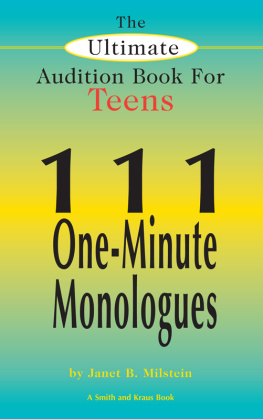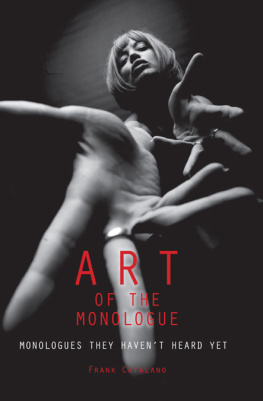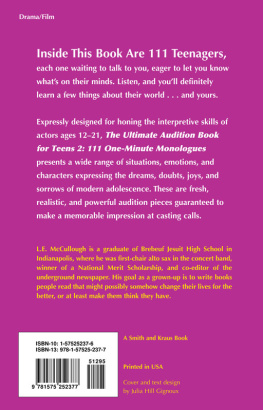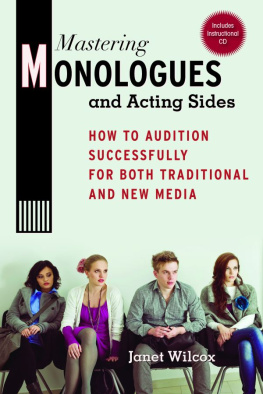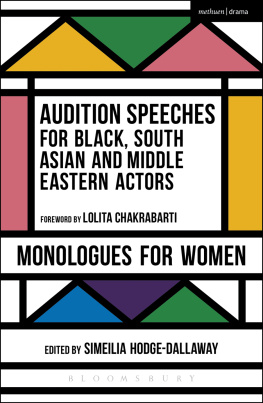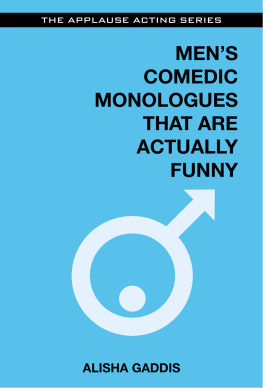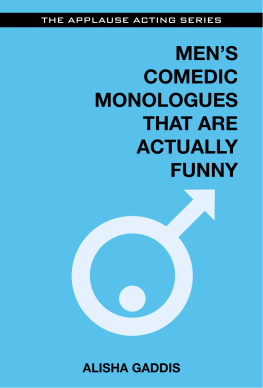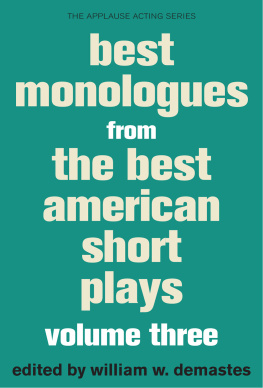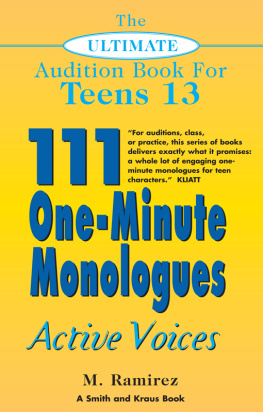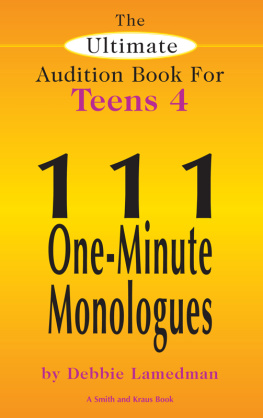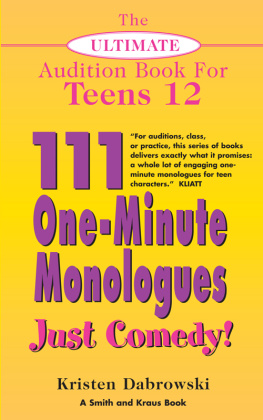THE ULTIMATE AUDITION BOOK FOR TEENS:
111 One-Minute Monologues
A Smith and Kraus Book
Published by Smith and Kraus, Inc.
177 Lyme Road, Hanover, NH 03755
www.SmithandKraus.com
Copyright 2000 by Janet B. Milstein
All rights reserved
Manufactured in the United States of America
Cover and Text Design by Julia Hill Gignoux
First Edition: June 2000
9 8 7 6 5 4 3 2 1
CAUTION: Professionals and amateurs are hereby warned that the material in this book is fully protected under the copyright laws of the United States of America, and of all countries covered by the International Copyright Union (including the Dominion of Canada and the rest of the British Commonwealth), and of all countries covered by the Pan-American Copyright Convention and the Universal Copyright Convention, and of all countries with which the United States has reciprocal copyright relations. All rights, including professional, amateur, motion picture, recitation, lecturing, public reading, radio broadcasting, television, video or sound taping, all other forms of mechanical or electronic reproductions such as CD-ROM and CD-I, information storage and retrieval systems and photocopying, and the rights of translation into foreign languages, are strictly reserved.
Library of Congress Cataloging-in-Publication Data
Milstein, Janet B.
The ultimate audition book for teens : 111 one-minute monologues / by Janet B. Milstein.-- 1st ed.
p. cm. -- (Young actors series)
Summary: A collection of 111 original monologues, all about one minute long, to be used by male and female teenage actors in auditions.
ISBN-10: 1-57525-236-8 ISBN-13: 978-1-57525-236-0
1. Monologues. 2. Acting. 3. Auditions. [1. Monologues.
2. Acting--Auditions.] I. Title. II. Young actor series.
PN2080 .M47 2000
812'.6--dc21
00-035864
THE ULTIMATE AUDITION BOOK FOR TEENS:
111 One-Minute Monologues
By
Janet B. Milstein
YOUNG ACTORS SERIES
A Smith and Kraus Book
SPECIAL THANKS
I would like to express my deepest gratitude to Barbara Lhota. I cannot thank her enough for all of her time, feedback, patience, and support as I endlessly subjected her to one monologue after the other. She is an extraordinary person, a gifted writer, and a true friend.
I would also like to thank Karen Milstein for editing the non-monologue text in this book. She is a fabulous writer and editor, and I am truly honored and lucky to have her as my sister.
In addition, I am extremely grateful to Maureen Aitken for kindly offering me her guidance, advice, knowledge, and time at the beginning stages of my efforts. She is a remarkably talented writer and a wonderful person.
ACKNOWLEDGMENTS
I would like to thank the following people for their generous work on the monologues in this book, and others for their inspiration and support:
Maureen Aitken
Jamie Allain
Robert Bobby Allen
Jason Amato
Mary Elisabeth Armstrong
Brendan Arnold
Alexandra Bean
James Bezy
Allie Bianchi
Melanie Braxton
Carla Bruni
Adam Budz
Lauren Carnevale
Edson Castillo
Crystal Celestaine
Marissa Cerar
Justin Cholewa
Philip Cole
Angelique Cooper
Ellen Crabill
Yolanda Craig
Chris Cullen
Martin Czerep
Heather Dannewitz
Erin Davidson-Mary
Eric Davis
Mark Davis
Anthony DiGiorgio
Jenni Dunn
Joseph Durkin
Eleni Filippi
Brittani Franklin
Lacey Free
Jennifer Gifford
Cosima Mina Greco
Tracy Gromek
Michael Harrah
Taylor Harris
Patricia Heath
Allison Hillary
Jane Hoffman
Patrick Johnson
Barbara Kanady
Jenna Klym
Millie Larson
Christy LaVigne
Jessica Lewis
John Lewis III
Stephanie Magoon
Alice Mayo
John Miller
Amethyst Milstein
Donald Milstein
Freda Milstein
Karen Milstein
Karen Kovy Milstein
Kathryn Milstein
Joshua Milstein
Melissa Milstein
Natalie Novy Milstein
Peggy Darla D Milstein
Jessel Monteverde
George Moskal
Marisa Nasti
Charlotte Noordzy
Donna & Drew Peel
Danielle Plesh
LaNeda Pitts
Dianna Poulos
Victor Pratt
Amber Rabe
Brandon Ramsey
Alma Ruiz
Jeremy Sklar
Diana Skrypek
Sharon Smyers
Ricky Staub
Brenda Stock
Kimberly Tabor
Coretha Timko
Angela Ventrella
Greg Vojtanek
Chas Vrba
Kevin Walsh
Stephanie Welander
Alison Wilbur
Heather Winter
Matt Wisner
Jennifer Yale
INTRODUCTION
A s an actor and acting teacher, I am all too familiar with the difficult task of finding a good monologue. After listening to my peers and students voice the same frustrations, I decided to try writing monologues specifically for them. Remarkably, they loved the pieces, and I was grateful that they had helped me discover a dormant talent. Then came the second request. I only have a minute. Can you cut this down? Its true that most audition slots have shortened from the standard two-minute to one-minute intervals. How could I refuse?
About the same time I began training actors to participate in the International Modeling and Talent Association (IMTA) competitions. The conventions are huge, the competition is steep, and the agents, casting directors, and personal managers come from all over the world to scout for new talent. Actors would be asked to perform comedic and dramatic monologues. The time allotted? You guessed itone minute. Unfortunately, when these actors showed me their selected monologues, it seemed that every piece was overdone, not in their casting range, requiring dialects, inactive, or, most importantly, not showcasing their potential. The teenagers were having an especially hard time finding good pieces because there are so few monologues from plays for actors in their age range. Furthermore, the original pieces they found usually sounded like speeches to no one in particular and presented the actors as cranky, whiny, rude, or (like, ya know, like, ya know) dumb. What they needed were powerful, direct, one-minute monologues in language and situations they could relate to without being stereotyped as obnoxious. I picked up a pen and a tiny notebook and dove in. The result is this book.
Many of the pieces have now been performed at the IMTA conventions by actors I have coached. Some have won awards. Other monologues have been worked and revised but never performed in competition. Therefore, if an award is not noted, it does not mean a piece is less effective than those that won awards.
What you will find in the pages to follow is a multitude of monologues that are new to the public, but have been put to the test. They are packed with emotional depth, hilarious experiences, honesty, pain, and charm, in a variety of voices that you can relate to. The monologues have direct, active openings that immediately connect the actor to the invisible other. No dialects or accents are required. The majority of the pieces are one minute in length; I have included a few that are slightly shorter or longer. Most importantly, the pieces in this book are written in real language and real situations, and they are really fun to work on.
I have given titles to the monologues in this book. DO NOT LOOK FOR PLAYS WITH THESE TITLES BECAUSE THEY DO NOT EXIST. I titled the pieces simply for convenience when auditioning since an actor is often asked, So, what will you be doing for us today? Think of the monologues as titled solo pieces.
My hope is that you will find not one but several monologues within these pages to use for virtually all of your audition needs. And when it is time to expand your repertoire, you will come back to this book to choose more. Good hunting, best wishes, have fun, and break a leg!
Next page
